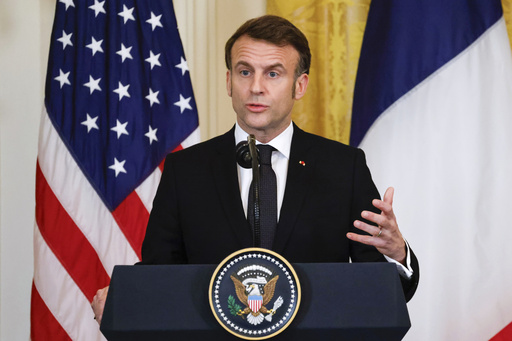In Washington, President Donald Trump expressed optimism about the conclusion of Russia’s conflict in Ukraine during a meeting with French President Emmanuel Macron on the invasion’s third anniversary. Trump discussed the potential for European peacekeepers in Ukraine, believing Russian President Vladimir Putin might agree to their deployment to maintain peace. He anticipated the war might conclude within weeks, with Ukrainian President Volodymyr Zelenskyy expected to visit the United States soon to finalize a deal granting the U.S. access to Ukraine’s valuable minerals. This agreement is intended as a partial repayment of the $180 billion in aid the U.S. has provided since the war began.
During the start of his bilateral meeting with Macron, Trump informed reporters of these developments, suggesting Zelenskyy could arrive in Washington imminently. Both leaders also engaged in a virtual conference with fellow Group of Seven nations, focusing on the ongoing conflict. These discussions take place amid a period of uncertainty for transatlantic relations, as Trump’s foreign policy approach challenges traditional European leadership by aiming for a swift resolution to the Ukrainian war.
Amidst this backdrop, Ukraine seeks security assurances as part of any peace arrangement. However, Trump did not specify if the proposed agreement includes American security commitments. He conveyed that Europe would ensure stability. On the other hand, Macron stressed at a press briefing with Trump that European nations should enhance their defense but warned against conceding to Russia. He emphasized the importance of preserving Ukrainian sovereignty as part of peace efforts.
Reflecting on these matters, Trump suggested Putin might accept European peacekeepers in Ukraine under a potential peace agreement. The Kremlin, however, has not commented on this development. Historically, Putin has been vocal in criticizing Western military presence near Russian borders, stating European or U.S. forces in Ukraine would pose significant security concerns for Moscow. Nevertheless, Trump’s return to power marks a pivotal moment for Europe, affecting American diplomacy’s longstanding role in maintaining global stability.
Ian Kelly, a former U.S. ambassador, expressed concerns about the implications of Trump’s foreign policy shift, suggesting it undermines decades of efforts to counter aggressive tactics without thorough discussion. This situation underscores the broader implications of redefining U.S. foreign policy principles, with Trump’s approach diverging from the values under which international bodies like the United Nations were established.
Looking ahead, Trump is scheduled to meet British Prime Minister Keir Starmer later this week. Prior to these discussions, Trump’s critique of Zelenskyy for not progressing peace negotiations and reluctance to agree to a minerals deal without assured Ukrainian security caused apprehension among European allies. Trump’s decision to commence preliminary talks with Russian representatives in Saudi Arabia, excluding Ukrainian and European delegates, further strained relations.
In a separate development, the U.S. failed to pass a U.N. resolution urging an end to the conflict that did not specify Russian aggression. Meanwhile, a European-backed resolution calling for immediate Russian withdrawal gained the assembly’s support. Zelenskyy highlighted the need for a comprehensive economic deal integrated into a security framework for Ukraine, following initial resistance to the minerals agreement due to insufficient security provisions.
Previous tensions included Trump disparaging Zelenskyy as a “dictator,” misattributing the war’s start to Ukraine. In response, Zelenskyy accused Trump of being swayed by Russian disinformation. Analysts suggest direct confrontation with Trump often backfires, advising a more measured response.
Macron, prior to meeting Trump, planned to emphasize the strategic importance of demonstrating strength against Putin, and how this stance would impact U.S. interactions with China, a significant global economic and military rival. He highlighted the need for a strong front against Putin to maintain credibility in dealings with China. Despite this, Trump has displayed respect for Putin, previously suggesting Russia’s return to the Group of Seven major economies, from which it was excluded following Crimea’s annexation in 2014.
